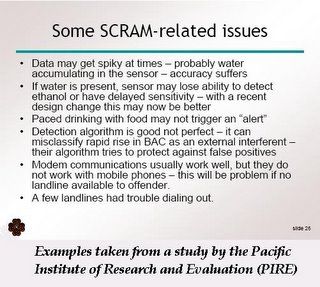SCRAM: If The Courts Don't Buy It, The Defendants Will 2

DURHAM -- Judges and lawyers are mixed on the propriety of using unapproved monitors called SCRAMS to monitor drunken driving suspects.
Durham District Judge Marcia Morey expressed outrage that, until recently, a SCRAM marketer was given front-of-the-courtroom access that made him appear to be an official state functionary.
Kenneth Hewett, the salesman, now sits in the spectator section of the courtroom. However, he remains free to approach DWI suspects and attempt to turn them into customers.
"It's a dangerous precedent for the court to start empowering private companies like this," said Morey. "There's tremendous potential for disreputable companies to make money in the criminal justice system. We're supposed to enforce the law, not enrich private companies.
"The way this has been applied and presented so far is at best questionable and at worst unethical, perhaps even illegal if false pretenses are used," Morey said.
She said it was wrong to let people think they would receive judicial leniency by using SCRAM.
By law, the judge noted, those convicted of the most serious level of DWI must serve 30 or more days in jail whether or not they abstained from alcohol while awaiting trial. Those found guilty of the next highest level must be locked up for at least seven days.
But at least two judges, Craig Brown of Durham and Joe Buckner of the Orange-Chatham district, are on the opposite side of the fence from Morey when it comes to SCRAM.
Buckner has an endorsement on the company's Web site, describing SCRAM as the best thing to hit North Carolina since electricity. His photo and another endorsement appear on the company's promotional literature.
"I'm not selling the product," Buckner said in an interview Friday. "If people in Durham don't want to use it, that's their business. If people have other good ideas to address what everybody agrees to be a problem, I'm ready. I'm not wedded to SCRAM or any other one solution. I just know we need to manage the problem drinkers who are out there maiming and killing people on our highways."
Brown, who was assigned last week to Durham's high-volume traffic court, gave his audience a short talk about SCRAM. He said some DWI defendants might want to consider the monitoring device. But he also noted that its use was voluntary, and that the SCRAM marketer was not a judicial employee.
"I try to be extremely neutral," said Brown. "SCRAM is a for-profit business. I don't think it's my job to blow their horn. Any judge has to be very careful about promoting a for-profit product of any kind. That's not my place. I'm not a salesman. But I do think this equipment has some value both in terms of public protection and treatment for those with alcohol problems."
Lawyer Marcus Hill said he often recommends the device to clients.
For one thing, it lets judges know conclusively if a person has been drinking between the time of his arrest and trial, according to Hill.
"A lot of clients say, 'I'm clean, I'm clean,'" Hill said. "But judges hear that so much, they sometimes discount it. This allows us to prove someone is not drinking."
In addition, pretrial abstinence for a repeat drunken driver might mean the difference between a jail sentence of 30 days and a term as long as two years, according to Hill.
Lawyer Bill Thomas said, on the other hand, that he would be "extremely hesitant to have any device put on a client that was not proven to be 100 percent accurate. A false positive reading could prove problematic. You could, in fact, create a problem that didn't exist.
"I also have questions about a private company being in the courtroom and trying to sell something for a profit," said Thomas. "This should be closely regulated and approved by the state."
http://www.herald-sun.com/durham/4-687171.html
The SCRAM bracelet cannot be removed by the offender or easily tricked. An infrared laser reflects onto the skin and records an obstruction if something, such as a sock, gets between the leg and the bracelet. In Warren County, Mo., offenders using the bracelet get one "free" obstruction; after that, an obstruction is counted as a violation...
http://www.innovations.harvard.edu/news/9315.html
If SCRAM proves reliable, probation departments could cut costs, said AMS officials. 03/2004
http://www.window.state.tx.us/txinnovator/ti0403/

0 Comments:
Post a Comment
<< Home